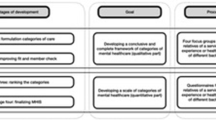Abstract
Background: Lack of consensus about the meaning of severe mental illness makes it difficult to prioritise the severely mentally ill for specialist mental health care. The goal of this study was to develop a valid and brief assessment of severity of mental illness. Method: Six search workshops (n = 57) using consensus techniques developed a draft assessment acceptable to users, carers, practitioners and policy makers. A two-round Delphi consultation (n = 58) was held to identify consensus on this instrument. Results: Search workshops agreed seven domains relevant to identifying the severely mentally ill: intentional and unintentional self-harm, risk from and to others, and survival, psychological, and social needs and disabilities. The Delphi consultation indicated at least agreement with all aspects in both rounds. Conclusions: The Threshold Assessment Grid (TAG) is a brief method of identifying the severely mentally ill, which has adequate face, concurrent, construct and content validity.
Similar content being viewed by others
Author information
Authors and Affiliations
Additional information
Accepted: 10 November 1999
Rights and permissions
About this article
Cite this article
Slade, M., Powell, R., Rosen, A. et al. Threshold Assessment Grid (TAG): the development of a valid and brief scale to assess the severity of mental illness. Soc Psychiatry Psychiatr Epidemiol 35, 78–85 (2000). https://doi.org/10.1007/s001270050011
Issue Date:
DOI: https://doi.org/10.1007/s001270050011




